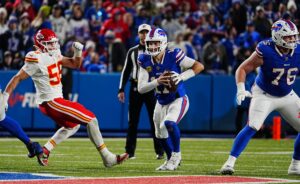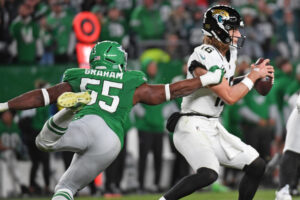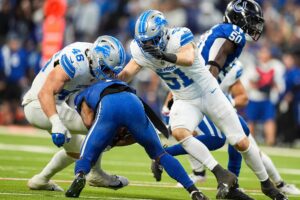Dan Marino passed for 61,361 yards and 420 touchdowns in his career, both NFL records at the time of his retirement. In his second year as a pro, he became the first quarterback to throw for over 5,000 yards in a season while also setting an NFL record for passing touchdowns in a season with 48, a record that has since been broken. Marino was consistently seen as one of the NFL’s best quarterbacks in his time in the NFL from 1983 to 1999. Many today describe him as one of the best pure passers in league history, a master of the quarterback position. And yet, despite all of this, he’s often left out of the discussion when it comes to “The Greatest Of All Time” because of one reason: his team never won a Super Bowl.
Why Rings Shouldn’t Determine The Greatest Quarterbacks
Most of the time, when discussing the best quarterbacks of all time, rings play a major factor in the discussion. Super Bowl titles seem to be the determining factor for so many people. And yet, championships, while certainly something to keep in mind when discussing the best of the best, are nothing more than team accomplishments. Teams win Super Bowls, not individual quarterbacks. Tom Brady, winner of five Super Bowl titles and easily among the top five quarterbacks in NFL history, has benefited from factors that Dan Marino never had.
In every season that Brady has won the Super Bowl, he has benefited from a top ten defense. Dan Marino only had a top ten defense in four of his seventeen seasons as an NFL quarterback. While neither quarterback can say they ever possessed a truly formidable running game, Brady’s teams have had five different seasons in which they possessed a 1,000-yard rusher, while Marino only had one, and that came towards the twilight of his career.
But Doesn’t The Quarterback Have The Most Impact On A Super Bowl Title?
It’s argued all the time that because the quarterback is supposed to be the team’s leader and have the biggest impact on the success of the team, the majority of the blame for failure rests upon their shoulders. This can be true at times, but failure to win in the sport of football is a team failure, not a failure by an individual player. There are 53 men on an NFL roster, 11 of which start on offense and 11 of which start on defense. Most often, the inability to win a game doesn’t rest on just any one player. Football is a team sport for a reason and, while the quarterback does have the biggest impact on the success of a team, too often they are blamed for their own team’s failures.
Look at the 2015 NFC Championship between the Packers and Seahawks. Green Bay’s own defense gave up 12 points in the span of just under five minutes and Brandon Bostick dropped an onside kick with 2:09 left to play that would’ve all but sealed the win, and yet it was the quarterback, Aaron Rodgers, who got a large amount of the blame. Sure, he didn’t have his best performance, but he was also playing on a torn calf and led the team on a game-tying drive in the final 1:22 after his defense gave up the lead. Rodgers didn’t see the ball in overtime. He did enough to get the Packers a win that day, but they lost and he got a lot of the blame for his own team’s failure.
Defense Has Hindered Rodgers’s Ability To Succeed In The Playoffs
It’s games like the 2015 NFC Championship that sum up the career of Aaron Rodgers. Rodgers is heavily criticized for his inability to win in the playoffs (even though he does have a winning record), and yet in all seventeen of his playoff games, his defense has given up an average of about 25 points a game, and 36 in his seven losses. Compare that to Tom Brady, who’s defense in his 34 playoff games has given up an average of 20 points a game and 26 points per game in losses. Brady’s defenses have only given up over 30 points twice in 34 playoff games, while Rodgers’s defenses have almost given up 30 on average. And yet people still give Brady all of the credit for his 25-9 playoff record while, at the same time, criticizing Rodgers for a 10-7 playoff record.
Last Word
The point here is that championships have too much weight when determining the best quarterbacks. If Tom Brady is better than Peyton Manning because Brady has won five Super Bowls and Manning only two, then by using that exact same argument Eli Manning is a better quarterback than Warren Moon or Marino because he’s won two Super Bowls and both Moon and Marino are without a title. There is so much more that goes into a team winning a title than just the performance of the quarterback, and yet all too often the quarterback either gets all of the blame for a Super Bowl loss/playoff failure or all of the credit for a team’s Super Bowl title/playoff success.
Main Photo






